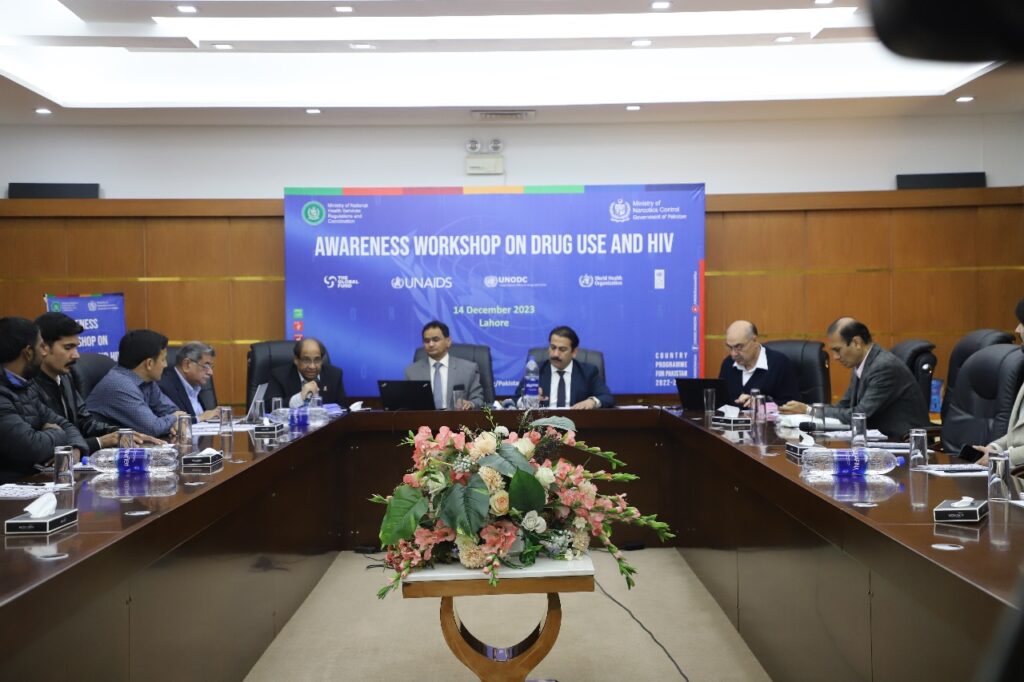
Lahore – The Ministry of National Health Services, Regulations and Coordination, Islamabad organized an ‘Awareness Workshop on Drug Use and HIV’ in collaboration with Ministry of Narcotics Control (MONC), UNODC, UNDP, UNAIDS and WHO in Lahore. Purpose of this workshop was to create awareness among health journalists on drug abuse, HIV AIDS, HIV prevention among people who inject drugs (PWID), harm reduction and OAMT.The one-day workshop was attended by representatives of key media houses and prominent health journalists. Dr. Farrukh Mehmood, UNODC welcomed all the participants and said that the workshop is being organized to create awareness on drug use and drug use related HIV, the various interventions/approaches for drug dependence treatment and prevention of HIV and blood borne infections transmission among PWID. Mr. Naeem Malik, Ministry of NHSR&C presented a brief background of HIV and AIDS epidemic in the country and shared other dynamics of this deadly and silent disease. He said Government of Pakistan is committed to halt the disease and putting all resources with the support of provincial AIDS Control Programs as well as UN partners and Global Fund for fight AIDS TB and Malaria. He shared that over the last decade, the disease is concentrated in certain key populations like Injecting drug users, Male sex worker and Transgender. He added that the epidemic in drug users in Pakistan is alarmingly high. He said this meeting is organized to share details of a newly initiative of OAMT which is related to address the issues related to drug users.The participants were briefed that drug use has social and economic impact of drug use on families, society and country and the financial situation of the families of the drug users has an impact on family nutrition and education. The family of the drug user is socially isolated because of the stigma attached to drug use. Increased crime is also associated with drug use. There is high vulnerability of children to drug use due to presence of drug use in the family. Drug use increases the burden on health services, not only related to their drug treatment but also other health problems including Hepatitis B and C and HIV. As drug problem requires a comprehensive multisectoral response from various departments/sectors.There is low level of awareness about harms associated with drug use and a serious need to raise awareness on drugs prevention including harms associated with drug use. Drug treatment services need to be strengthened both in terms of quality of drug treatment and coverage of treatment services. MONHSR&C, MONC and UNODC have developed ‘Drug treatment protocols’ and ‘Drug treatment guidelines’ for Pakistan. Several trainings based on the treatment guidelines were arranged for the treatment centres staff from the Government as well as private/NGO run drug treatment facilities. Risk behaviors (including sharing syringes and sexual risk behaviors) of drug users increase their vulnerability to HIV. High HIV prevalence in people who inject drugs (PWID) shows that a lot needs to be done which includes increasing coverage of services for PWID.World Health Organization and UNODC, consider drug dependence a chronically relapsing health disorder which often co-occurs with other mental and physical conditions. Drug dependence is not a failure of will or strength of character but a medical condition that could affect anyone. Just like any other chronic health condition, such as hypertension or diabetes, the treatment of drug dependence requires a health-oriented response. Among pharmacological approaches, WHO and UNODC recommend countries to introduce and expand access to opioid agonist maintenance treatment (OAMT) for people with opioid dependence. OAMT involves use of a safe prescribed medicine, such as buprenorphine under medical supervision. The benefits of OAMT have been documented by the WHO, UNODC and UNAIDS, the main benefit being that the person who has been using illicit drugs no longer experiences severe withdrawal symptoms and therefore is able to stabilize his/her life. The injecting drug user stops injecting and sharing syringe which prevents transmission of HIV, Hepatitis and other blood borne diseases. People suffering from dependence on opioids require long-term drug treatment, rehabilitation and care. Drug dependence treatment aims at improving the health and quality of people suffering from drug dependence managed by people who are professionals and who understand the basic underlying health condition.